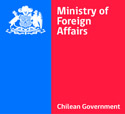
The acting Minister of Foreign Affairs, Edgardo Riveros, accompanied by the acting Minister of Justice and Human Rights, Ignacio Suárez; the Director of the Civil Registry, Luis Acevedo; the acting Under-Secretary of Public Health, Pedro Crocco; and the acting Under-Secretary of Education, Vivien Villagrán, launched the website www.apostilla.gob.cl this morning, containing official information on the implementation of the Apostille Convention in a single digital platform.
An Apostille certificate is a one-step certification procedure that simplifies the current chain of legalization of foreign public documents, reducing the number of steps that citizens must perform in order to prove a document's authenticity (currently known as legalization), and can be done in Chile or abroad.
Although this certification will enter into force on August 30, 2016, the website is now available for advance information for people or organizations wishing to validate foreign public documents.
The site includes information on what the Apostille Convention is and how it works; where the certification can be done and the competent authorities to do so; the rules and features of the Chilean Apostille and member countries of the Convention. There is also a section on frequently asked questions and a contact form.
"Our idea is to spread the word about the Apostille at all levels, with national and international mass media campaigns, so that we can take advantage of a very important benefit in a world already so interconnected. In addition, as we abbreviate the process of legalization, we can also receive Apostille certificates from the other 111 signatory countries of the agreement," said acting Minister Riveros.
One of the aspects highlighted by Riveros was the benefit that this system will bring for those living in regions outside of Santiago: "Today, if a person wants to legalize a document so that it is accepted abroad but they happen to live in Puerto Montt, for example, this person has to come to Santiago to go through the legalization procedures. Once the Apostille comes into force, that person can do the procedure from Puerto Montt without having to come to Santiago."
In addition to the Foreign Ministry which currently leads the Apostille coordination efforts, the Ministries of Education, Justice and Health and the Civil Registry and Identification Service will also be entitled to make Apostille certifications.
